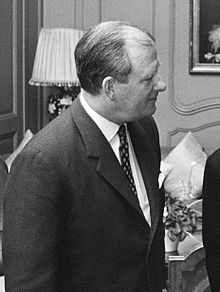Edward Tomkins
|
Sir Edward Tomkins GCMG CVO |
|
|---|---|

Edward Tomkins in 1970
|
|
| British Ambassador to France | |
|
In office 1972–1975 |
|
| Preceded by | Sir Christopher Soames |
| Succeeded by | Sir Nicholas Henderson |
| British Ambassador to the Netherlands | |
|
In office 1970–1972 |
|
| Preceded by | Sir Peter Garan |
| Succeeded by | John Barnes |
| Personal details | |
| Born |
16 November 1915 Jubbulpore, India |
| Died | 20 September 2007 Sibbertoft, England |
| Nationality | British |
| Spouse(s) | Gillian Benson (1955–2003) |
| Alma mater | Trinity College, Cambridge |
| Occupation | Diplomat |
| Awards | Croix de Guerre |
| Military service | |
| Allegiance |
|
| Service/branch |
|
| Years of service | 1940–1944 |
| Unit | Intelligence Corps |
| Battles/wars | Second World War |
Sir Edward Emile Tomkins GCMG CVO (16 November 1915 – 20 September 2007) was a British diplomat, who served as British Ambassador to the Netherlands from 1970 to 1972, and British Ambassador to France from 1972 to 1975. He owned Winslow Hall in Winslow, Buckinghamshire, often attributed to Christopher Wren, from 1959.
Tomkins was the son of Lieutenant Colonel Ernest Leith Tomkins and his French wife, and was raised partly in France and thus grew up speaking perfect French. He was educated at Ampleforth College and Trinity College, Cambridge. He joined the Diplomatic Service in 1939. After joining the Army in 1940 during World War II, he served as a liaison officer with the Free French Forces in the Middle East. He was captured by German Field Marshal Erwin Rommel in 1941 while making his way back to British lines from the battle of Bir Hakeim with French General Marie Pierre Kœnig.
He was imprisoned in Camp 41, a prisoner-of-war camp near Parma in northern Italy, alongside Pat Gibson and Nigel Strutt. Strutt was repatriated on medical grounds, and Gibson and Tomkins were moved to another camp. He and Gibson escaped from the new camp, and spent 81 days walking 500 miles (800 km) south to Bari, crossing the Apennines and German lines, to return to Allied-held territory. He was awarded the French Croix de Guerre for his services.
...
Wikipedia
